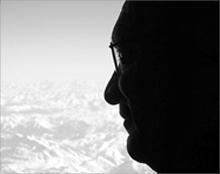There is no such thing as was—only is,” William Faulkner wrote. “If
was existed, there would be no grief or sorrow.” Time is a human
creation.

Time keeps then now. Time causes
aging, not age. A mayfly has no time to realize its lifecycle is mere
hours; fellow mayflies don’t remind it or post countdown clocks on its
walls. By and within ourselves we are ageless. And time is what we make
of it. We must make the time to do what we do best, what we were born to
do.
Light is the universal mind revealing
its potential. “Let there be light,” the creator said, and his very
words were the light “that shineth in the darkness, and the darkness did
not comprehend it.” Without the darkness whence it came, there would be
no light; darkness is the chaos created by fear, unease with the
universe—but also the womb of love and light. Light begets perception,
and perception at its brightest is what we call vision.
Let your voice
rise to the heavens called the Elder and the voices of the group rose
strong and clear to greet the First Ray to celebrate its arrival in the
cycle of this new lifetime as the ancients called the day this new
journey of the Earth around the axis of its heart, to welcome it with
outstretched arms and hearts wide open yes here the Light loved to shine
Reading Birgitte’s words makes me
rejoice anew in that time of first light that I’ve sought throughout my
life to dedicate to vision. Born on a farm, I’m happiest when I awaken
an hour or two before dawn. This is my time, spent with a cup of savory
coffee and a half-hour of reading inspirational words like these;
followed by attending to my latest “visionary” project. Currently,
that’s the completion of a family chronicle; prior to that it was my
novel The Messiah Matrix, which explores the origins of Christianity from an unusual and little-discussed historical perspective.
I believe in the power of stories to change the world. My passion for stories has not only changed my life; it has been my life—hundreds of books sold to publishers or published by Story Merchant Books, two dozen New York Times
bestsellers, thirty movies produced to date, several television series
sold. All stories I felt needed to be told. It’s been my beloved
vocation to inspire storytellers to reach for their maximum audiences.
The books and movies we’ve developed have reached millions worldwide and
it’s the best feeling to hear, on a plane from Hong Kong to Tokyo, that
a complete stranger saw “The Meg” or “The Kennedy Detail” and loved
it.
Each day I’m ready for the sunrise,
facing it with an exhilarating sense of promise and potential—and the
power to choose how I fulfill it.
Vision weaves light and time into
patterns, drawing our attention to them as confidently as male peacocks
spread their tail feathers, young bucks clash with their antlers, or sea
anemones vibrate color, drawing attention to the lifeforce’s need to
replicate itself, thereby overcoming time and dancing with love and
immortality.
What is the purpose of this cosmic
dance? we wonder. What is the purpose of life? Just as a California
poppy bursts open with hues brighter than the rainbow, an antelope leaps
across the Colorado prairie because she can, or the alpha lion’s mane
grows shaggier with power, the purpose of life is simply to fill our
human experience with forms we create to celebrate the splendor and
beauty of the universal mind.
One of those forms is time, the first
expression created by humanity in response to the universal creation of
light. While we wait for life to make its ultimate expression known to
us, we ourselves reach for it by bathing in the light the universe sends
to remind us of its eternal promise.
No matter how far we ever are from
reaching that highest expression of ourselves, let us remember the words
of Spanish philosopher José Ortega y Gasset: “I think the only immoral
thing is for a being not to live every instant of its life with the
utmost intensity.” That’s what Mahatma Gandhi meant when he declared,
“Full effort is full success.”
Birgitte’s mellifluous prose reminds
us that you cannot fail at being yourself, which means doing with all
your might what you were born to do with your light, your vision, and
your time.
~ Ken Atchity



















